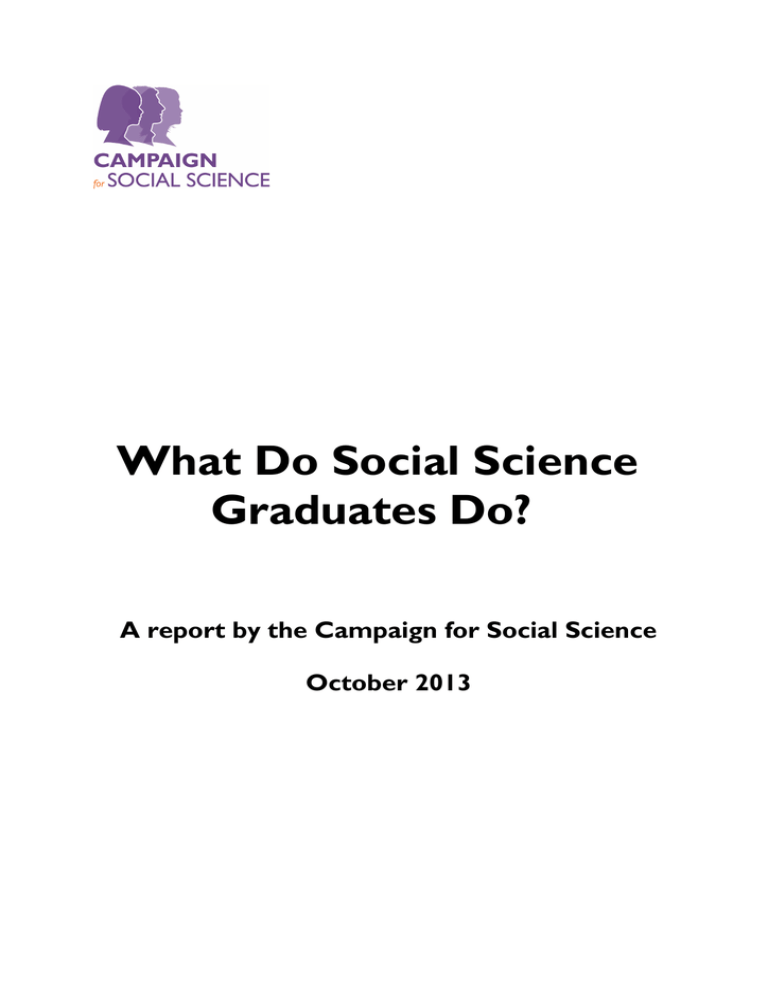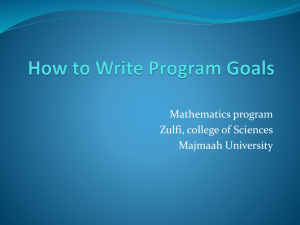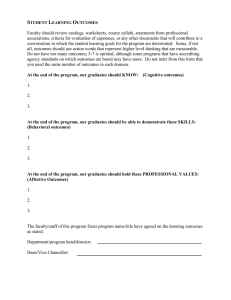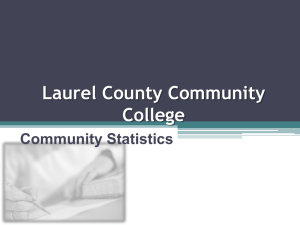
What Do Social Science
Graduates Do?
A report by the Campaign for Social Science
October 2013
Contents
Page 3
Foreword by Professor Cary Cooper CBE AcSS and
Professor James Wilsdon
Page 4
Introduction
Page 5
Employment rates
Page 7
Occupations
Page 9
Industries
Page 12
Further resources for students
Page 12
Notes on subject data
Page 13
Case studies
Foreword, by Professors Cary Cooper and James Wilsdon
We were particularly pleased to be asked to write the introduction to this report on the careers of
social science graduates, which analyses the latest data from the Destinations of Leavers from Higher
Education longitudinal survey.1
Among the facts this report uncovers are:
• At 3.5 years after graduating, the proportion of social science graduates in employment is higher
than that of graduates of STEM subjects (science, technology, engineering and mathematics) or artshumanities.
• A higher proportion of social science graduates are in managerial and senior official roles than
graduates of STEM or arts-humanities subjects, at the same point in time.
• A higher proportion of social science graduates are employed in the ‘professional, scientific and
technical’ and ‘financial’ industries than STEM or arts-humanities graduates.
The idea that social science graduates work solely as social workers or teachers is shown to be
unfounded. What this report shows instead is that employers across many areas of employment, in
both the public and private sectors, are keen to recruit social science graduates because they have
the skills of analysis and communication that our economy and society needs.
Gosia Slominski, who graduated from Cardiff University with a BSc in Economics with German and is
now working as a management trainee at HSBC, puts it well in our case study: “A degree in social
science will equip you with a wealth of skills to help you throughout your career, whatever you want
to go into,” she says. “The opportunities open to you upon graduation are far reaching and, in my
experience, looked upon well by employers across many professions.”
Gosia is right: social science graduates have the skills that employers in all areas of our economy and
society need badly. So we in turn must ensure that we maintain our social science capacity because it
pays us back many-fold.
Professor Cary Cooper CBE AcSS
Chair, Academy of Social Sciences
1
Professor James Wilsdon
Chair, Campaign for Social Science
Published in August 2013 by the Higher Education Statistics Agency.
What Do Social Science Graduates Do? © Campaign for Social Science, October 2013, Page 3
Introduction
The social sciences – which encompass sociology, politics, economics, law, education, business
studies, town planning and many others – “examine and explain human functioning on a variety of
interlocking levels, ranging from neural foundations to individual behaviour, group processes and the
functioning of entire societies” (European Scientific Foundation 2013).
Graduates in social science subjects offer a wide range of skills that are enormously
valuable to employers across the public, private and third sectors. These include the ability to
understand complex issues holistically, on individual and cultural and societal levels; research, analyse
and evaluate data critically; question assumptions; understand people, institutions and their
relationships; understand processes of change; make reasoned arguments; communicate concisely
and clearly and solve problems.2
But where do social scientists take these skills after graduating? The Campaign for Social
Science, with statisticians from the Warwick Institute for Employment Research, has analysed data
from the Destinations of Leavers from Higher Education longitudinal survey conducted by the
Higher Education Statistics Agency, and collected case studies from recent graduates, to reveal the
destinations of social science graduates at approximately 3.5 years after graduating. The study is
based on the latest available longitudinal survey results, namely of graduates who completed full-time
and part-time first degree courses in 2008/9.3
2
For more on skills gained by studying a social science degree, see the Open University Careers Advisory
Service 2013.
3
The survey uses a sample of 62,205 graduates from among the 354,730 who completed an earlier census at 6
months after leaving (called the Destinations of Leavers from Higher Education Early Survey). It is weighted to
account for oversampled sub-groups. For more information see the HESA website.
What Do Social Science Graduates Do? © Campaign for Social Science, October 2013, Page 4
Employment rates
A higher proportion of social scientists are in employment than STEM (science,
technology, engineering and mathematics) or arts-humanities graduates: 84.2% of social
science graduates, compared with 77.8% of STEM graduates and 78.7% of arts-humanities graduates,
are in employment at this period.
The difference between the employment rates of those who studied full-time and part-time is also
much smaller among social science graduates: their rates of employment are consistently high.
A smaller proportion of social science graduates are in further study, however – 10.1%
compared with 17.3% from STEM and 11.5% from arts-humanities degree backgrounds.
Social science graduates who pursue further study are more likely to combine it with
employment than their STEM and arts-humanities graduate peers. For example Elinor Owe, a
graduate in social psychology, studied for a PhD at the University of Sussex while working as a
Research Officer in Scottish Government. See the Campaign website for her case-study.
These findings are consistent with the last longitudinal survey (those who graduated in 2006/7).
See Chart 1 for the percentage of social science graduates in employment or further study.
What Do Social Science Graduates Do? © Campaign for Social Science, October 2013, Page 5
1. Employment status of social science
graduates
© Campaign for Social Science, 2013
Occupations
Among those in employment, 7 in 10 social scientists are in ‘professional’ or ‘associate
professional and technical’ occupations within 3.5 years of graduating. 4
This includes researchers (among them such as Elisabeth Brickell, a sociology graduate working for
GfK National Opinion Polling), teachers (such as Tom Holder, an Oxford graduate who joined
Teach First), accountants, business analysts, recruitment and management consultants, legal
professionals, town planners, social and community workers and insurance brokers, among many
others. See pages 15 and 17 for the case studies.
A greater proportion of social scientists are already ‘managers, directors and senior
officials’ than graduates of any other subject group, 3.5 years after graduating from their first
degrees: this accounts for 7.6% of employed social science graduates, compared with 3.6% of
graduates in STEM and 6.2% in arts-humanities. ‘Business and administrative studies’ graduates are
especially highly represented, followed by ‘architecture, building and planning’, and social studies
graduates.5
See Chart 2 for the occupations of social science graduates after 3.5 years.
4
Occupations are classified according to a version of the Standard Occupational Classification known as
SOC2010 (DLHE): click on the link to download the list.
5
See page 12 for information on the categorisation of subjects.
What Do Social Science Graduates Do? © Campaign for Social Science, October 2013, Page 7
© Campaign for Social Science, 2013
Industries
Social scientists take up these occupations in a broad range of industries across the public, private
and third sectors.
Higher proportions of social scientists are employed in ‘professional, scientific and
technical activities’ than any other subject group. 6 This industry accounts for 1 in 5
employed social scientists (19.8%) – a considerably greater proportion than STEM (10.9%) or artshumanities (14.2%) graduates. Social scientists remain more highly represented than STEM graduates
even after discounting law and architecture graduates, whose vocational degrees are likely to steer
them towards professional activities in particular.
The types of work classified under this category include experimental and market research (such as
Elisabeth Brickell, a sociology graduate who works for GfK National Opinion Polling); management
consultancy; advertising; accounting, book-keeping, auditing and legal activities; industrial design and
architectural activities; labour recruitment and many others. See page 17 for Elisabeth’s case study.
Likewise, nearly twice the proportion of social scientists is employed in ‘financial and
insurance activities’ compared with STEM or arts-humanities graduates – 7.1% compared
with 3.7% and 3.9% respectively. This includes occupations in banks, insurance and pension funding,
and other kinds of financial management. Graduates of business and administrative studies, social
studies and law and are particularly represented, such as Gosia Slominski who studied economics at
Cardiff and is now an Executive Management Trainee on the HSBC graduate scheme. See page 13 for
her case study.
After discounting graduates with degrees specifically in education (of whom 78.7% enter
employment in the same industry), a smaller proportion of social scientists is employed in
education (10.4%) than either STEM (14.3%) or arts-humanities graduates (25.4%). This
appears consistent with the low content of social science in the National Curriculum. Nevertheless
social scientists who become teachers may teach a range of subjects related to their degree: Tom
Holder, an Oxford graduate of Politics, Philosophy and Economics, joined the Teach First Leadership
Development Programme as an economics, business studies, philosophy and maths teacher in a
secondary school.
6
Industries are classified according to the 2007 Standard Industrial Classification of Economic Activities ( SIC
2007) as published by the Office for National Statistics.
What Do Social Science Graduates Do? © Campaign for Social Science, October 2013, Page 9
The proportion of social science graduates employed in ‘human health and social work
activities’ (12.6%) is less than half that of either STEM graduates (34.2%) – even after
discounting those who studied medicine or dentistry (which brings the STEM proportion down to
28.4%).7 Examples cited in the Higher Education Careers Service Unit publication, 'What Do
Graduates Do?', include a politics graduate employed as a youth advice worker for a charity, and a
psychology graduate working as a rehabilitation coordinator at a health and social care company.
1 in 13 social science graduates (7.7%) work in ‘public administration and defence’ or
‘compulsory social security.’ This sector includes activities in central, regional and local
government, the provision of community services, and judicial activities, among others. Michael
Payne, for example, who graduated in law from the University of Lancaster in 2008, went into
politics: he is currently Deputy Leader of Gedling Borough Council. See the Campaign website for his
case study. Just 3.7% of social scientists work in ‘administrative or support service activities.’
Proportions of social scientists in ‘manufacturing’ or ‘information and communication’ are lower than
those of STEM or arts-humanities graduates. Those in ‘wholesale and retail trade, and repair’ are
fractionally higher than STEM graduates but lower than the national graduate average.
See Chart 3 for the industries in which social science graduates are employed after 3.5 years.
7
The proportions may be closer than the data suggests, given that psychology graduates, although social
scientists, are submerged under the category of ‘biological sciences’ under the JACS2 codes (see Notes on
Subject Data, below).
What Do Social Science Graduates Do? © Campaign for Social Science, October 2013, Page 10
3. Employment industries, by degree subject
group
Social science*
STEM
Arts-humanities
© Campaign for Social Science, 2013
*Excludes education graduates, whose profile is markedly different:
78.3% of education graduates work in education; 1.1% professional, scientific and technical activities; 9.7% human
health and social work activities; 2.9% public administration, defence and compulsory social security; 2.6% wholesale
and retail trade and repair of motor vehicles and motorcycles; 0.7% financial and insurance activities; 0.5% administrative and support service activities; 0.8% manufacturing; 0.4% information and communication; 2.7% other.
†
"Other" includes: the following industries:
Accommodation and food service activities; Construction; Real estate activities; Arts, entertainment and recreation;
Transport and storage; Other service activities; Electricity, gas, steam and air conditioning supply; Mining and quarrying; Water supply, sewerage, waste management and remediation activities; Agriculture, forestry and fishing; Activities of extraterritorial organisations and bodies; Activities of households as employers, and undifferentiated goodsand services-producing activities of households for own use.
Further resources for students
Prospects – ‘Options with your subject’ (Search career options by degree subject)
BestCourse4me – ‘Explore by subject areas’ (Search career options by degree subject)
Higher Education Careers Service Unit – ‘What do graduates do?’ (Graduate destinations by
individual degree subject, at just 6 months after graduating)
Kent University – ‘What can I do with a degree in…?’ (Careers options by degree subject)
Open University Careers Advisory Service 2013 (Social scientists’ skills and careers opportunities)
Unistats (Search for degree courses and compare official course data from universities and colleges)
Notes on subject data
The Destinations of Leavers from Higher Education survey data are categorised into subject areas
according to the Joint Academic Coding System (JACS2). Of these we have counted ‘social studies’,
‘business and administrative studies’, law, education, and ‘architecture, building and planning’ as social
sciences. Although the Campaign considers psychology a social science, regrettably JACS2 classifies it
under the biological sciences, so for the purposes of this analysis it has been unavoidable to group it
under STEM (science, technology, engineering and mathematics). For a break-down of individual
subjects included within each subject area, see JACS2.
We have omitted subject data for ‘agriculture & related subjects’ and combined subject degrees
from our analysis as these were not easily definable as either social sciences, arts-humanities or
STEM. Part-time degrees were excluded where sample sizes were too small.
What Do Social Science Graduates Do? © Campaign for Social Science, October 2013, Page 12
Graduate Destinations: Case study 1
Gosia Slominski
BSc Economics with German, Cardiff University,
2012
•
Executive Management Trainee at HSBC, since
September 2012
What has been your path from graduation to your current post?
I was offered my current position after completing a Summer internship with HSBC during
my penultimate year of study. This meant I could have started my career straight after
graduating. However I thought it was important to take a break between studying and
working so I spent a month travelling around Eastern Canada and a month in Spain before
taking up my current post.
What are your main responsibilities in your current role?
My role varies widely from placement to placement. I am currently working as an Executive
Assistant to the regional management team in the Corporate Banking division. This involves
collating, analysing and presenting internal management information, organising regional
meetings and working on various projects. Alongside my main role I am also learning how to
analyse company accounts in order to be able to put together lending applications.
What are the most rewarding and most challenging aspects of this role?
The most challenging part of my role is managing my time effectively. I sometimes work to
tight deadlines, and with complex information. I am also studying for a banking qualification,
whilst constantly learning new skills at work. Despite these challenges, the satisfaction of
completing a project successfully always makes it worthwhile.
What Do Social Science Graduates Do? © Campaign for Social Science, October 2013, Page 13
How has your social science degree helped you at work?
Studying economics gave me a helpful insight into financial markets and the banking industry.
I gained a lot of valuable knowledge and important tools which have helped me to pick things
up more quickly at work. Combining economics with German also gave me an international
perspective which is important when working for a global company such as HSBC. However
the most important skills I picked up were the analytical skills, because these are more
difficult to develop.
What do you think social science graduates can offer to employers that other graduates
might not?
Rather than being a pure arts or science subject, economics combines a broad range of skills
from numerical, to verbal reasoning, to analytical. Upon graduating, students have a large,
transferable toolkit of resources they can take with them into a wide range of professions
and sectors.
Any advice for sixth-form students considering studying social science at degree level?
A degree in social science will equip you with a wealth of skills to help you throughout your
career, whatever you want to go into. The opportunities open to you upon graduation are
far reaching, and in my experience looked upon well by employers across many professions.
If you are not sure if it is for you then I would advise reading around the subject. In the case
of economics it is also important not to be put off by the maths!
What Do Social Science Graduates Do? © Campaign for Social Science, October 2013, Page 14
Graduate Destinations: Case study 2
Tom Holder
BA Politics, Philosophy and Economics, University of
Oxford, 2007
•
Campaigns Manager, Understanding Animal
Research, since September 2012
What has been your path from graduation to your current post?
Much of my employment history has been built on my involvement in “Pro-Test” (which support
animal research for medicine) during university. Upon graduating in Politics, Philosophy and
Economics, I spent several months working to organise a Pro-Test event in Oxford. During this
time I accepted the Michael D. Hayre Fellowship in Public Outreach, supported by Americans
for Medical Progress (AMP), and moved to Washington DC in March 2008. While working with
AMP I founded the organisation Speaking of Research, Pro-Test’s international sister
organisation. During the seven months I spent in the US, I travelled around research institutions
giving presentations and making connections.
After returning to the UK I joined Teach First and began teaching Maths, Economics, Business
Studies and Philosophy at a secondary school in London. During this time I continued to work to
expand Speaking of Research, supporting the rise of Pro-Test for Science in Los Angeles. This
paid off, and in 2012 I joined Understanding Animal Research as Campaigns Manager.
What are your main responsibilities in your current role?
I look after the social media for Understanding Animal Research. Beyond this I come up with new
project ideas to help explain animal research to the public. Recently I began organising a set of
debates which will take place in university debating societies across the country. I have also set
up the Science Action Network, which helps researchers to respond to misinformation about
animal research on the internet. My experience as a teacher enables me to get involved with our
education team, while my previous work in pro-research organisations allows me to support
both the communications and online content teams.
What Do Social Science Graduates Do? © Campaign for Social Science, October 2013, Page 15
What are the most rewarding and most challenging aspects?
I enjoy the variety of activities I get involved in, from schools talks and strategy meetings, to
Twitter and Reddit. This diversity of duties also creates challenges – trying to set up new
campaigns for which I have little or no previous experience. This requires research and reflection
at every stage – assessing how ideas can be taken forward, executed more effectively, and
capitalised on afterwards.
How has your social science degree helped you at work?
Creating solid arguments was a foundation of my degree. Being able to research, write and
deliver compelling arguments on the role of animals in research has been essential to my current
role.
The lack of a scientific background has, somewhat counter-intuitively, helped my ability explain
science by preventing me from becoming over-technical in my explanations. Essentially, if I can
understand the science, so can others.
What do you think social science graduates can offer to employers that other graduates
might not?
I think every graduate is different, but broadly social science graduates tend to offer some shared
skills. Their smaller proportion of contact hours can make them effective at managing their own
time. They are used to reviewing large amounts of information quickly, aiming to get the key facts
without drowning in the details. And they often have a better appreciation of the larger political
and economic environment within which many decisions are made.
Any advice to social science undergraduates or sixth form students considering their
next steps?
Find something you enjoy doing and pursue it. Social Science graduates are very flexible between
many careers and shouldn’t feel their selection of subjects, at school or university, should shoe
horn them into any specific field. Their transferable skills in writing, researching and critical
thinking can be of huge benefit to employers in a wide range of careers.
What Do Social Science Graduates Do? © Campaign for Social Science, October 2013, Page 16
Graduate Destinations: Case study 3
Elisabeth Brickell
BSc Sociology, University of Surrey, 2007
•
Senior Research Executive, GfK NOP Social
Research, since January 2009
What has been your path from graduation to your current post?
My first introduction to the world of social/market research was whilst at university. My course
was a four year degree, with the third year spent on professional placement in the industry
wherein I worked as a Research Assistant in the social research team at the British Market
Research Bureau. I really enjoyed my time there and found I was able to put many of the skills
and knowledge learned during my course in to practice.
Soon after university I found (what was meant to be) a temporary, part time job working for a
local charity. I must have done something right as this turned into an 18 month, full-time job! I
learnt a lot of transferable project management skills, but I got to a point where I didn’t feel I
was reaching my full potential or really getting the chance to apply the things I had learned
during my degree. That’s when I started to think more in terms of a career than just a job – and
social/market research soon came to mind.
I applied for lots of jobs in the wider industry of market research, but the social research team
at GfK National Opinion Polling really caught my attention because of the context of their work
and reputation, and because of what the graduate scheme offered in terms of further training
and early career development. During my time here I have completed two MRS industry
recognised qualifications (the Advanced Certificate and the Diploma in Market and Social
Research) and attended many other training sessions.
What Do Social Science Graduates Do? © Campaign for Social Science, October 2013, Page 17
What are your main responsibilities in your current role?
GfK NOP is a full-service agency so we’re involved in all stages of the research lifecycle from the
design of a research project, to questionnaire design right through to analysing and presenting
the data. Effectively, no two days are the same!
I work in the quantitative social research team – our clients are made up of local and central
government departments, public sector organisations, academic organisations and charities. I’ve
had the opportunity to work on some really interesting projects for some key government
departments and organisations including the Department of Work and Pensions, the
Department of Energy and Climate Change, the Department of Health, the Food Standards
Agency and various NHS services.
My responsibilities as a research executive include:
• Preparing proposals and costings to clients
• Working with clients to design questionnaires
• Day-to-day project management and client liaisons
• Briefing other internal departments for fieldwork, data entry, data coding and data
processing
• Data analysis
• Preparation of client outputs – whether these be written or PowerPoint reports or
presentation slides
Working for a large organisation like GfK NOP has also offered me the chance to get involved in
lots of interesting activities beyond the day-to-day responsibilities. In my first year I chaired the
junior forum – a group for members of the graduate scheme to get together and discuss issues
relevant to them and report these back to the CEO. I’m involved in the company’s charity
committee which organises events throughout the year to raise money for charities. In the last
couple of years I’ve put my own training and qualifications to greater use by acting as a tutor for
new graduates undertaking the MRS Advanced Certificate qualification.
What are the most rewarding and most challenging aspects of this role?
Learning to balance differing timescales across a number of projects can be a challenge at first,
but I have found that time management and other skills developed on the job help to ensure that
priorities can be set and deadlines can be met.
After all the hard work managing a project it is really satisfying to get to the analysis stage where
you really get a chance to explore the data, see what it all means and report this in a way that is
relevant to the client’s needs. It’s nice to have some room for creativity in my role. And I find it
really rewarding to see the outcome of hard work in the form of actionable results for clients.
What Do Social Science Graduates Do? © Campaign for Social Science, October 2013, Page 18
How has your social science degree helped you at work?
I think my sociology degree has been invaluable in helping me get where I am today for a number
of reasons.
I wouldn’t have known about the world of social research (or at least it would have taken me
longer to find it) if it hadn’t been for my degree and professional placement which first
introduced me to it as a potential career.
Moreover I really think that the relevance of my degree, the skills and knowledge I acquired
during it (especially the research methods and statistics modules), and the additional skills and
experience gained on my professional placement year helped me to stand out as a suitable
candidate for the role.
Although the graduate training scheme at GfK NOP gives you a grounding in market research
skills and knowledge I think I was definitely in a strong position compared to other graduates
with non-social science degrees, as a lot of the concepts were things I had already come across
in my degree.
What do you think social science graduates can offer to employers that other graduates
might not?
In my opinion, what a sociology or other social sciences degree can offer in particular is a very
different and specialised way of looking at things. It teaches you to look beyond the surface and
really analyse interactions and behaviours. This inquisitive approach is definitely put to use in a
social/market research role, and is vital in enabling you to really look at and understand the data.
More and more our clients are looking for deeper insight in the findings we provide, so it’s key
to be able to approach a research project in this way and ask the “right” questions at all stages,
to be able to provide the client with meaningful and actionable data.
Any advice for sixth-form students considering studying social science at degree level?
If you haven’t considered studying sociology, do! It’s such an interesting subject that we can all
relate to in some way as it’s all about understanding the world in which we live in. If sociology
doesn’t sound quite what you’re looking for then look at other social sciences too. Besides being
interesting I think they can offer a lot of transferable skills and knowledge to take forward too.
I’ve had good feedback throughout my career on my written style in reports and liaisons with
clients and I’m certain that this came from the many hours of preparation for my sociology
exams – with the many conflicting sociological theorists to write about we were often told there
was no right or wrong answer, but whichever one we were giving needed to be delivered in a
clear, concise and convincing way.
Another benefit of a social science degree is the wide variety of career opportunities it can lead
you into. I have many friends who have studied social sciences (sociology, psychology or
combined courses such as sociology and media) and the careers that these have led them into
are vast, including social research, media research, HR, PR, teaching, policing, social work,
charity and community based work.
For more graduate case-studies, visit our website: www.campaignforsocialscience.org.uk
What Do Social Science Graduates Do? © Campaign for Social Science, October 2013, Page 19
This report was written by Roses Leech-Wilkinson
of the Campaign for Social Science
with support from statisticians, Peter Elias and Ritva Ellison
of the Institute for Employment Research, University of Warwick
To contact the Campaign, please call: 020 7330 9287
or email: campaign@acss.org.uk
www.campaignforsocialscience.org.uk
Twitter: @CfSocialScience
Facebook: www.facebook.com/CfSocialScience
© Campaign for Social Science 2013. All rights reserved.
The Campaign was launched and is sponsored by the Academy of Social Sciences, a
company registered in England, number 3847936, and a registered charity, number 1088537




